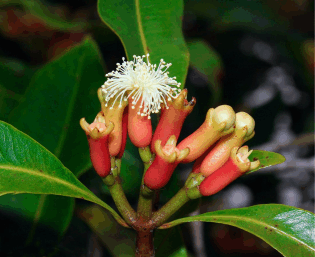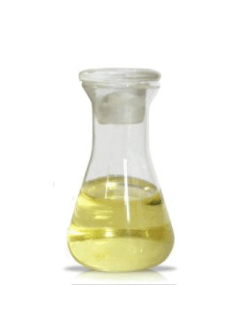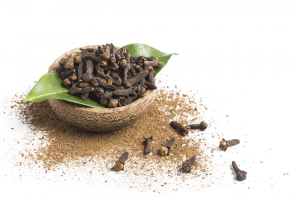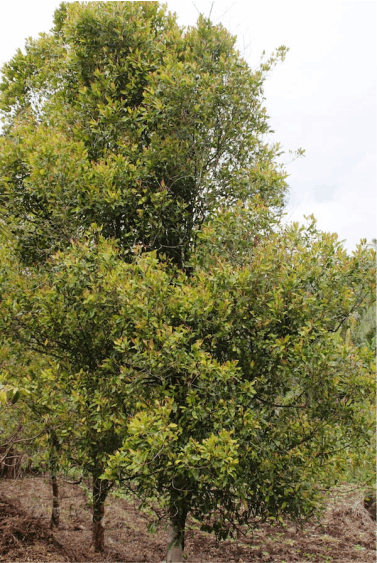What is Clove bud Oil?
Clove bud oil is a highly concentrated oil that is extracted from the flower buds of the clove tree, scientifically known as Syzygium aromaticum.
Syzygium aromaticum, also known as the clove tree, is native to the Maluku Islands in Indonesia, also known as the Spice Islands.
The clove tree is also cultivated in other tropical regions, such as India, Sri Lanka, Madagascar, and Tanzania, among others.
Clove bud essential oil contains a number of beneficial compounds!
The main active compound in clove bud oil is eugenol, which is responsible for its strong aroma and therapeutic properties.
What does Clove bud oil smell like?
The aroma of clove bud oil is warm, comforting, and invigorating, with a rich and complex character that is both powerful and soothing.
Eugenol has a sweet, spicy scent that is similar to cinnamon and nutmeg, with a slightly medicinal quality.
Eugenol, was registered with the US Environmental Protection Agency (EPA) as a pesticide in 1947. Since then, it has been widely used as a natural insecticide and pesticide in a variety of applications, including agriculture, public health, and household products.



Industrial uses for Clove bud Oil?
Clove bud oil
Industrial Uses- Flavor and fragrance industry: Clove bud oil is widely used in the flavor and fragrance industry to add a spicy, warm, and aromatic note to a variety of products, including food, beverages, and perfumes.
- Dental products: Clove bud oil is a popular ingredient in dental products, such as toothpaste and mouthwash, due to its natural antiseptic and pain-relieving properties.
- Pharmaceuticals: Clove bud oil is used in some pharmaceutical products as an antiseptic, analgesic, and anti-inflammatory agent. It is also sometimes used to treat digestive issues and respiratory problems.
- Insecticides: Clove bud oil is a natural insecticide that is effective against a wide range of pests, including mosquitoes, flies, and ants. It is often used in agriculture and horticulture to control insect infestations.
- Cleaning products: Clove bud oil is a natural disinfectant and is sometimes used in cleaning products, such as disinfectant sprays and surface cleaners.
- Industrial applications: Clove bud oil is used in a variety of industrial applications, such as in the production of plastics, lubricants, and adhesives.
Is Clove bud oil a natural bug repellent?
Yes, clove bud oil is a natural bug repellent that can be effective against a variety of insects!
How does Clove bud oil repel bugs?
Clove bud oil contains several bug repelling compounds:
eugenol, eugenyl acetate & beta-caryophyllene
Eugenol: is the main active ingredient in clove bud oil and has insecticidal properties that can help to repel insects. It works by interfering with insect nervous systems, causing paralysis or death. Eugenol also has a strong scent that insects find unpleasant and avoid.
Beta-caryophyllene: is a natural compound found in clove bud oil that has been shown to have insecticidal activity against mosquitoes. It works by targeting the nervous systems of insects, leading to paralysis and death.
Eugenyl acetate: is another compound found in clove bud oil that has been found to have repellent activity against flies. It works by disrupting the receptors in the insects’ olfactory system, making them less able to detect and locate their target.
The combination of these three compounds in clove bud oil makes it a potent bug repellent that can be effective against a wide range of insects, including mosquitoes, flies, and ants.
Is Clove bud Oil used in Minus Bite Family Bug Spray?
Yes, Clove bud oil is an active ingredient in our all natural family friendly bug spray as well as other highly effective essential oils.
Benefits of Using Clove bud Oil on the Skin at the right concentration
Antimicrobial activity: Clove bud oil contains compounds that have antimicrobial activity, which can help to fight bacteria and fungi that can cause skin infections or acne.
Analgesic and anti-inflammatory properties: The eugenol and other compounds in clove bud oil have analgesic and anti-inflammatory properties, which can help to reduce pain and swelling associated with skin conditions like eczema, psoriasis, and insect bites.
Natural bug repellent: As we mentioned earlier, clove bud oil can also be used as a natural bug repellent when applied to the skin. It can help to repel mosquitoes, flies, and other insects, making it a great choice for outdoor activities.
Skin nourishing: Clove bud oil can help to nourish the skin and keep it hydrated. It can also help to reduce the appearance of fine lines and wrinkles, making it a popular ingredient in anti-aging skincare products.
Aromatherapy benefits: Clove bud oil has a warm, spicy aroma that can have relaxing and soothing effects on the mind and body. It is often used in aromatherapy to promote feelings of calm and reduce stress.
Timeline of the Usage of
Clove Bud Essential Oil- Ancient China and India (200 BC – 300 AD): Cloves and clove oil were used for medicinal purposes in ancient China and India, particularly for treating toothaches and digestive problems.
- Ancient Rome (1st century AD): Cloves were introduced to Rome from India and were used in cooking, as a perfume, and for medicinal purposes.
- Middle Ages (5th – 15th century): Cloves were used as a spice and in perfumes throughout Europe during the Middle Ages. They were also used for medicinal purposes, particularly for treating toothaches and as a digestive aid.
- 17th century: Cloves and clove oil became popular in Europe as a treatment for various ailments, including toothaches, digestive issues, and respiratory problems.
- 19th century: Clove oil was first used as a dental analgesic by American dentist Dr. Horace Wells. It was later used by other dentists as a local anesthetic and disinfectant.
- 20th century: Clove oil continued to be used for dental and medicinal purposes, and was also used as a flavoring in food and beverages. In recent years, it has gained popularity as a natural remedy for various health and skin conditions, as well as a natural insect repellent.
Clove bud oil is a biopesticide
Biopesticides like clove bud oil are generally considered safer and more environmentally friendly than traditional chemical pesticides, as they are often more specific in their target and tend to have lower toxicity to non-target organisms.
Would you like some Minus Bite Bug Spray?

Eugenol, has been evaluated by the EPA and is registered as a biopesticide for use as an insecticide, miticide, and fungicide. Eugenol is considered a minimum-risk pesticide and is exempt from certain requirements under the Federal Insecticide, Fungicide, and Rodenticide Act (FIFRA).
Read More about Clove bud Oil
"Cloves as a Repellent"

5 Minute Read | Home Guides | Pest Control By Kathy Adams
"Toxicity and repellency of compounds from clove to red imported fire ants"

15 Minute Read | Journal of Economic Entomology | 2013 Feb

References:
United States Environmental Protection Agency (EPA). (2021). Biopesticides Overview. Retrieved from https://www.epa.gov/ingredients-used-pesticide-products/what-are-biopesticides
United States Environmental Protection Agency (EPA). (2017). Active Ingredient Fact Sheet – Eugenol. Retrieved from https://www.epa.gov/sites/default/files/pesticides/ingredients/2017-06/eugenol-factsheet-06-2017.pdf
Isman, M. B. (2006). Botanical insecticides, deterrents, and repellents in modern agriculture and an increasingly regulated world. Annual Review of Entomology, 51, 45-66.
Regnault-Roger, C., Vincent, C., & Arnason, J. T. (2012). Essential oils in insect control: low-risk products in a high-stakes world. Annual Review of Entomology, 57, 405-424.
Pavela, R. (2017). Essential oils for the development of eco-friendly mosquito larvicides: a review. Industrial Crops and Products, 110, 15-27.
